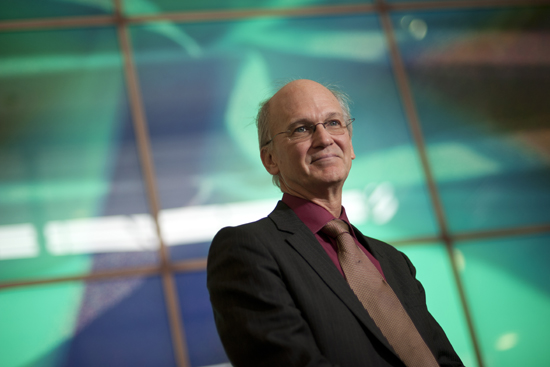Buying Time
Humanities junior faculty fellowships extended to a year

James Winn is the director of the BU Center for the Humanities, which will double the length of its junior faculty fellowships starting next year. Photo by Kalman Zabarsky
Humanities research is cheap.
“We don’t need big labs or atom smashers. What we need is a library and time,” says James Winn, director of the Boston University Center for the Humanities.
Time will be more available beginning in fall 2012, when the length of the junior faculty fellowships doubles from one semester to a full academic year.
“Junior faculty have only six years in which to amass a record of research to convince us to give them tenure,” says Winn, a William Fairfield Warren Distinguished Professor and a College of Arts & Sciences professor of English. “Six months of release from teaching is not enough time.”
While senior faculty members in the humanities can use sabbaticals to focus exclusively on their research and writing, junior faculty members must juggle teaching, research, and writing as tenure looms. The demands of teaching make it especially hard to get a book off the ground, he says.
“When you are teaching two courses, thinking and preparing for them and grading the papers eats up your time,” he says. “In order to write a book and do a good job, you need unbroken, quality time. You can’t work on a book in the odd half hour you have. What we are giving them is the immeasurable gift of time.”
Winn benefited from just such a gift himself. While a junior faculty member at Yale University, he was awarded a semester-long fellowship, during which he wrote his second book, Unsuspected Eloquence: A History of Relations Between Poetry and Music. “I couldn’t have built my career without it,” he says.
Carrie Preston, a CAS assistant professor of English, found that her semester-long fellowship last spring gave her the time to research at Waseda University in Tokyo and to dig into her second book project, on Japanese Noh theater and its influences.
“To start a book, to have time free to delve into it, feels crucial,” Preston says. “I think it’s really important for the University to support the research of junior faculty. If BU is to keep moving its profile up, it’s going to have to keep finding ways to support faculty research.”
The move also brings the center in line with other university humanities centers in the country, most of which offer yearlong fellowships for junior faculty, according to Winn. And the change will also help draw talent to Boston University, says Patricia Johnson, CAS associate dean of the humanities faculty.
“As someone who works on the hiring side of humanities, this is really going to be big,” says Johnson, who is also an associate professor of classical studies and a Metcalf Cup and Prize winner. “You can’t guess how many times people say they want to come here, but are concerned there’s no possibility of a year’s leave for research. This will make it possible to get top people. We usually get them, but this will make it much less of a scramble.”
Time does cost at least some money. The center must pay replacement teachers during a professor’s fellowship. Still, the center, whose budget is financed by earnings on its endowment, managed to double the length of the fellowships without new funding and to offer the same number as in years past (between four and seven). “We did a careful assessment of where we spend our money,” Winn says, “and thought if we were careful and scrupulous we could afford to do this.”
The fellowships are designed for faculty in their second through fourth year, when the time can make a substantial difference, he says. “At the end, it’s too late to help them and they need to be observed in the classroom.”
Now Winn has his sights set on the senior faculty fellowships, which currently are a semester long. He’d like to extend them to a year, and thus give more time away.
Information on how to apply for a junior faculty fellowship can be found here. Applications for next year are due by October 15.
Amy Sutherland can be reached at alks@bu.edu.
Comments & Discussion
Boston University moderates comments to facilitate an informed, substantive, civil conversation. Abusive, profane, self-promotional, misleading, incoherent or off-topic comments will be rejected. Moderators are staffed during regular business hours (EST) and can only accept comments written in English. Statistics or facts must include a citation or a link to the citation.